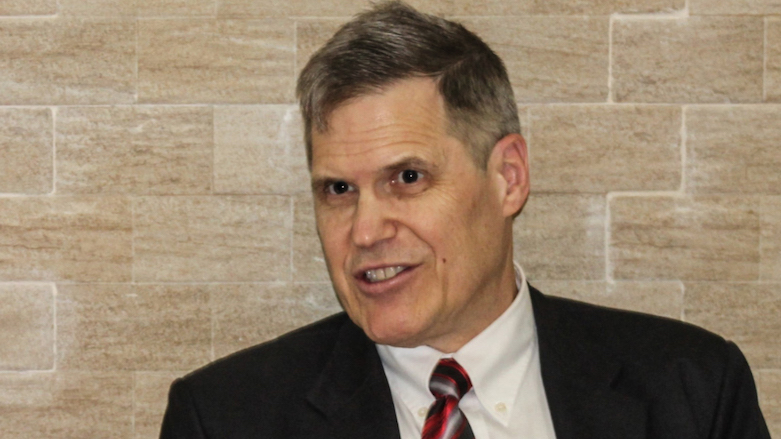Kurdish region is a model in Iraq: US Ambassador

ERBIL (Kurdistan 24) – The US Ambassador to Iraq Mathew Tueller said the Kurdistan Region is a model for Iraq on Tuesday.
“I think we all admire what has happened here over the last 30 years in the Kurdish region,” he said during a panel at the Middle East Research Institute (MERI) forum in Erbil.
A model
He also said that many in Iraq recognize that the Kurdistan Region “is where they want to come if they want to invest in businesses, if they want to buy property.”
“In fact, if they want to come for a vacation with the family, they come here to this region,” he added. “That's a model and we hope that that model is actually something that lives for the rest of the Iraqi state.”
Tueller also said that the history with “the Kurdish region has been one that largely I think has been based on strong partnership.”
Differences
He noted that the US and the Kurdistan region had their differences over the Kurdistan independence referendum on Sep. 25, 2017, in which the 92.73 percent majority voted in favor of independence from Iraq.
“We haven't always seen things in the same way. The referendum of 2017 was a very, very difficult moment,” he said. “Not just in terms of the US relationship with the Kurdish Regional Government, but I think it also really sort of highlighted the fact that there are still issues to be resolved in the relationship between Baghdad and Erbil.”
He pointed out that this year is the 30th anniversary of Operation Provide Comfort, the US-led humanitarian operation that followed the ceasefire to the 1991 Gulf War.
“So, this is 30 years now, where we have been present alongside our Kurdish partners, ultimately forming a Kurdish Regional Government with autonomy within the Iraqi federal state, that is not going to change,” he said.
Iraq is not Afghanistan
Tueller also said that it's fair to ask whether there are comparisons between US interests in Iraq and Afghanistan.
“And I'd echo my colleagues in saying the two very different countries go even farther, the US interest here in Iraq are very, very different than our interests that drew us into Afghanistan.”
Drone attacks
The US ambassador noted that there has been at least eight attacks on the Kurdistan Region since January.
“I will be frank, we know that the ammunition used in these attacks and the groups that conduct them, the support that they receive emanates from Iran,” he said.
Despite this, he added, the US isn’t seeking to sever relations between Iran and Iraq.
“There should be a healthy normal relationship.”
Nevertheless, he stressed that “it's unacceptable that this region or any other region of the world tries to exert its influence in a neighboring state by supporting armed groups that operate outside the control of the government.”
“Iraq needs to find a way to control this.”
Tueller also said that while Iran-backed groups claim their attacks are directed solely against the US presence in Iraq: “I think, in fact, the real target of these attacks is against the Kurdish Regional Government, against the Iraqi state and its institutions.”
Sanctions
The US ambassador also acknowledged that the effect of sanctions on Iranian-backed figures such as the Deputy Head of the Popular Mobilization Forces (PMF), Abdul Aziz al-Muhammadawi, also known as Abu Fadak, are quite limited because they are only imposed by the United States.
“Sanctions are a very, very limited tool in deterring or changing the behavior of actors, particularly if the sanctions are unilateral,” Tueller said. “I can almost assure you that Abu Fadak or others who are on the sanctions list for their role in this, they don't have bank accounts in the United States.”
“They're not particularly affected.”
Therefore, he said that “the US is engaged in an effort to review the effectiveness of sanctions policy, whether it's used in a way that establishes the intent of deterring or changing the behavior that we're seeking to change.”
